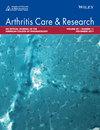Training to Increase Minority Enrollment in Lupus Clinical Trials With Community Engagement: Enhancing Lupus Clinical Trial Recruitment Through Provider and Community Health Worker Engagement
Abstract
Objective
This study evaluates the effectiveness of the Training to Increase Minority Enrollment in Lupus Clinical Trials with Community Engagement (TIMELY) program on enhancing referrals of underrepresented patients to lupus clinical trials. TIMELY leverages two existing American College of Rheumatology online educational initiatives: Materials to Increase Minority Involvement in Clinical Trials (MIMICT), a continuing medical education activity for health care providers, and the community health worker (CHW) Lupus Clinical Trials Training (LuCTT). TIMELY introduced a unique roundtable meeting format to build on the existing online educational programs and facilitate discussions between local clinical trial sites and provider and CHW participants.
Methods
This study used an online pretest and posttest design to assess changes in theory-based behavioral predictors of lupus clinical trial referrals and engagement (ie, knowledge, attitudes, self-efficacy, and intentions) among providers and CHWs. Participants completed MIMICT or LuCTT and then were eligible to participate in roundtable meetings. Paired t-tests were used to assess changes in composite scores before and after the intervention for each of the outcomes.
Results
The final sample included 40 providers and 18 CHWs. Knowledge scores increased significantly for both providers (P < 0.01) and CHWs (P < 0.001) on completion of MIMICT and LuCTT, respectively. After participating in the TIMELY roundtable, providers’ composite scores for self-efficacy and intentions significantly increased (P < 0.001). Provider self-efficacy gains were sustained at three months’ follow-up (P < 0.001).
Conclusion
These promising findings highlight the potential and opportunities for the TIMELY program to improve behavioral predictors of trial referrals, including CHW knowledge and providers’ knowledge, self-efficacy, and intentions to refer underrepresented patients to lupus clinical trials.

 求助内容:
求助内容: 应助结果提醒方式:
应助结果提醒方式:


